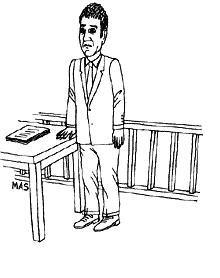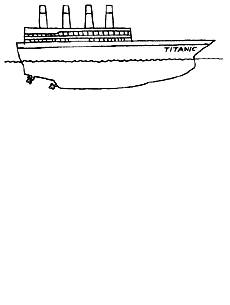
Movie
Trial and Error (New Line Cinema). While noting the film's cheap gags and formulaic plot, critics end up smiling at this slapstick courtroom comedy, which stars Michael Richards, Seinfeld's Kramer. "[M]uch fresher and sunnier than it has any real right to be," says the New York Times' Janet Maslin. Richards' character is an out-of-work actor who fakes being an attorney. But his performance is pure Kramer, "a hipster doofus just the same" (Rita Kempley, the Washington Post). Even British director Jonathan Lynn is forgiven for indulging in the same lawyer jokes and romantic-comedy subplots he used in My Cousin Vinny. (Click here for the Trial and Error site.)
Music
Blood on the Dance Floor--HIStory in the Mix, Michael Jackson (Epic). The megastar of '80s pop has hit bottom, critics say. Sales of his new album are dismal, and reviewers complain that the music--five new songs and eight remixes of old ones--is pathetically recycled material. Jackson, says Entertainment Weekly's Tom Sinclair, has "gone the way of the Jheri Curl ..., as removed from mainstream pop as Rosemary Clooney." Critics bash his lyrics for their clichés and their misogyny, and Jackson for indulging in self-pity that bleeds into self-parody. "Mr. Jackson seems like the elephant man, screaming that he is a human being," says the New York Times' Neil Strauss. (The album is trumpeted on Jackson's own elaborate site.)
Television
Bill Clinton: Rock & Roll President (VH1; June 3; 8 and 10 p.m. EDT/PDT). This hourlong bull session with the president, in which he flips through his album collection and reminisces about the Beatles, is called sappy and boring. (The producer is the daughter of Carolyn Staley, a lifelong Friend of Bill's.) "[T]he program has the puffy, adoring style of an image-building campaign documentary," says the New York Times' Caryn James. Despite the show's folksy pretensions, Clinton is said to still come across as a political beast, promoting funding for the arts and physical education. "There he goes again, rambling around, unable to stay on message, unrestrainably throwing in the kitchen sink" (Diane Werts, Newsday). (VH1 offers clips.)
Port Charles (ABC; weekdays; 12:30 p.m. EDT/PDT). Top daytime soap General Hospital spins off, to general approval. The new show is set in the same hospital, but with younger, hipper characters, "as if the cast of Beverly Hills 90210 had all graduated and become doctors" (Sharon Bernstein, the Los Angeles Times). Despite its unsoap-operatic pace--prime-time quick, with rap music to boot--it basically sticks to the soap formula of good and evil characters, love affairs, and tear-jerking scenes. It "should have no trouble creating a solid place for itself among the young and restless" (Marilyn Moss, the Hollywood Reporter). Others predict failure, since the soap genre has rarely attracted anyone under 30. (Click here for the Port Charles site.)
Books
Race, Crime, and the Law, by Randall Kennedy (Pantheon Books). The Harvard Law professor's book on race gets plaudits for its equal-opportunity attacks on both the left (for tendentiously seeing racism everywhere) and the right (for willfully seeing racism nowhere). "An admirable, courageous and meticulously fair and honest book," says Roger Parloff in the New York Times Book Review. Kennedy's endorsement of extreme race-neutrality--race shouldn't be a factor in stopping criminal-suspect searches or in assembling juries, he says--does strike a few as naive. Newsweek's Ellis Cose says Kennedy never resolves "the battle between the ethical ideal he cherishes and the moral muddle of the actual world."
Virginia Woolf, by Hermione Lee (Knopf). After umpteen biographies celebrating "Bloomsbury's mad feminist," Lee's is saluted for rediscovering the "real Woolf." A British academic, Lee contends Woolf wasn't nearly as mad as previous biographers have alleged. Praise goes to Lee's argument, her sensitivity, and her writing. "[W]e have a book worthy of its subject--graceful, astonishingly well researched, yet imbued with a sense of flow that is rarely achieved at this level of scholarship," says Daphne Merkin in the New York Times Book Review. (See Sarah Kerr's review in Slate.)
Kowloon Tong, by Paul Theroux (Houghton Mifflin Co.). What critics like most about novelist and travel writer Paul Theroux's new work of fiction--about a British family in Hong Kong as the Chinese government takes back control--comes less from the novelist than the travel writer. His evocation of Hong Kong is "full of sharp observations--on subjects ranging from politics to food to sex to servitude" (Dwight Garner, Newsday). But his protagonist, a misanthropic businessman named Neville "Bunt" Mullard, is deemed poorly drawn. Glimpses into his character "do not add up to a full motivation for Bunt's aimlessness" (Thomas Keneally, the New York Times Book Review).

Event
The Tony Awards (June 1, Radio City Music Hall, New York City). Broadway's version of the Academy Awards, threatened with cancellation by CBS after years of abysmal ratings, rebounds with viewers--drawing record Nielsens--but not with critics. Hostess Rosie O'Donnell and a parade of non-theater celebrity presenters get the credit for the big audience, but critics pan O'Donnell's transparent rip-off of Billy Crystal's Oscars shtick. It was, says the Washington Post's Lloyd Rose, the same old "people wearing dresses of varying embarrassment and crying and hugging and saying they loved each other." (See "The Week/The Spin" for more on the results.)
Art
"Objects of Desire: The Modern Still Life" (Museum of Modern Art). This survey of 20th century still-life art is derided as predictable. "The exhibition almost never deviates from the Modern's pantheon of anointed artists," says the New York Times' Roberta Smith. Critics decry the show for showcasing the old boys (Cézanne, Picasso, Jasper Johns) to the exclusion of women, minorities, and newer artists. The New Yorker's Calvin Tomkins, however, gives it a hearty endorsement. "Exhibitions that purport to sum up ... the hundred-plus-year life span of modern art are on every museum's agenda these days ... but it will be hard to find one whose focus is as clear as this one, or whose premise holds up as well." (Click here for the MoMA site.)
Updates
Robert Hughes' much-touted PBS series on American art finally airs, generating a conservative backlash. Hughes-hater Hilton Kramer, writing in the New York Observer, snipes that "American Visions simply--and very simply at times--ratifies the establishment vision of what counts in recent American art," and the Wall Street Journal's Ann Berman and the Weekly Standard's David Gelernter also get in their digs. ... The Actual, Saul Bellow's novella, receives more compliments. The New Republic's James Wood admires its "own nervous perfection," and Alfred Kazin, writing in the New York Review of Books, rates it a notch below Bellow's great works. ... In the New York Times Book Review, Miss Manners, Judith Martin, is peeved by Sylvia Jukes Morris' discourteous treatment of Claire Boothe Luce. Reading the book, she says, "is like being on confidential terms with someone who hates her boss. ... [Morris] will hardly allow her new subject the smallest uncontaminated virtue."
Recent "Summary Judgment" columns
Movie--The Lost World;
Movie--Addicted to Love;
Movie--Brassed Off;
Television--Murder One (ABC);
Theater--King David;
Music--Flaming Pie, by Paul McCartney;
Book--Che Guevara: A Revolutionary Life, by Jon Lee Anderson;
Book--Rage for Fame: The Ascent of Clare Boothe Luce, by Sylvia Jukes Morris;
Art--New Chinese Galleries (Metropolitan Museum of Art).
Book--Underboss: Sammy the Bull Gravano's Story of Life in the Mafia, by Peter Maas;
Book--The Actual: A Novella, by Saul Bellow;
Television--Roseanne (ABC);
Television--David Blaine: Street Magic (ABC);
Event--Cannes International Film Festival;
Movie--Night Falls on Manhattan;
Movie--Love! Valour! Compassion!;
Theater--The Wizard of Oz.
Architecture--New Amsterdam Theater;
Event--Cannes International Film Festival;
Movie--Father's Day;
Movie--The Fifth Element;
Movie--The Designated Mourner;
Television--The Odyssey (NBC);
Book--The Courage to Stand Alone: Letters From Prison and Other Writings, by Wei Jingsheng, translated and edited by Kristina M. Torgeson;
Book--Time Bind: When Work Becomes Home and Home Becomes Work, by Arlie Russell Hochschild;
Theater--Candide;
Museum--Newseum.
Book--Mason & Dixon, by Thomas Pynchon;
Book/Television--American Visions: The Epic History of Art in America, by Robert Hughes, and American Visions (PBS);
Book--Echo House, by Ward Just;
Book--Reading in the Dark, by Seamus Deane;
Architecture--Franklin Delano Roosevelt Memorial;
Television--The Last Don (CBS);
Movie--Children of the Revolution;
Movie--Breakdown.
--Compiled by Franklin Foer and the editors of Slate.
